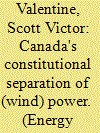| Srl | Item |
| 1 |
ID:
094880


|
|
|
|
|
| Publication |
2010.
|
| Summary/Abstract |
This paper investigates the impact that a federal government structure has on strategic selection of renewable energy policy instruments. The context for this study centers on wind power development in Canada. Canada is a nation that is blessed by all the attributes necessary to catalyze global leadership in installed wind power capacity. Unfortunately, the constitutional separation of powers that underpins Canada's federal system impedes the creation of a national wind power development strategy because Canada's provinces have constitutional authority over electricity governance. The insights gleaned from the case study are used to develop a conceptual framework for understanding the impact that federal structure has on policy instrument selection and efficacy under areas of federal, regional and concurrent policy jurisdiction. Finally, this framework is re-applied to identify specific approaches the Canadian federal government could take to resolve what currently amounts to be a fragmented, ineffective approach to wind power development planning.
|
|
|
|
|
|
|
|
|
|
|
|
|
|
|
|
| 2 |
ID:
122951


|
|
|
|
|
| Publication |
2013.
|
| Summary/Abstract |
This article reviews the pros and cons of the United Nations Framework Convention on Climate Change (UNFCCC) climate change mitigation regime and the polycentric initiatives that have arisen in response to phlegmatic progress in international climate change mitigation efforts. It concludes that the combined efficacy of the UNFCCC regime and these polycentric initiatives embody necessary but insufficient efforts to avert the perils associated with amplified climate change scenarios. The author concludes by proposing that a bilateral agreement between the USA and China that focuses on exploiting national commercial synergies represents a promising strategy through which to encourage enhanced commitment by these two key nations to greenhouse gas reduction. Regardless of whether or not a US-China partnership materialises, the notion of bilateral agreements between developed and developing nations-such as Japan and Brazil, or India and the EU block of nations-and of the ensuing competition among these national pairings could be a missing element to more effective climate change mitigation efforts.
|
|
|
|
|
|
|
|
|
|
|
|
|
|
|
|
| 3 |
ID:
110358


|
|
|
|
|
| Publication |
2011.
|
| Summary/Abstract |
This paper analyzes Japan's national power generation strategy with a view to explaining Japan's phlegmatic approach to wind energy development. The analysis concludes that Japan's current power generation strategy is not optimized to achieve the government's three strategic energy objectives of simultaneously enhancing economic security, national energy security and environmental security (3Es). To achieve long-run energy sustainability, Japan needs to strive to phase out nuclear power, which is the centerpiece of its current power generation strategy. The analysis concludes by offering four suggestions for a sustainable 3E power generation strategy: (1) internalize all external costs associated with power generation technologies in order to level the economic playing field, (2) increase feed-in mandates for renewable energy to 20%, (3) fully liberalize the power generation industry and (4) intensify R&D in energy storage technologies to support intermittent renewable technologies.
|
|
|
|
|
|
|
|
|
|
|
|
|
|
|
|
| 4 |
ID:
108975


|
|
|
|
|
| Publication |
2011.
|
| Summary/Abstract |
There is an adage in China '???? (Wú Yuè tóng zhou)', which translates as 'Wu and Yue in the same boat'. This purportedly refers to events during the Spring and Autumn Period (770-221 BC) of the Zhou Dynasty that forced two rival states, the Wu and the Yue, to cooperate in dealing with widespread flooding. The phrase characterizes situations in which adversaries must join forces to overcome a common challenge, and is possibly the etymological foundation of the English phrase 'to be in the same boat'. Certain scholars contend that the axiom exemplifies the political relationship between the United States and China.1
Yan Xuetong has recently introduced in the Chinese Journal of International Politics the genesis of a fruitful discussion that has been carried forward by Alastair Iain Johnston in regard to explaining the Sino-American relationship.2 Essentially, Yan has put forth a theory of 'superficial friendship' wherein he argues that mutually unfavourable interests exceed mutually favourable interests in the Sino-American relationship. This, coupled with high expectations that both nations have in regard to support from one another, engenders the development of a 'superficial friendship'.3 Yan further posits that superficial friendships are unstable relationships that propagate exaggerated highs and lows, which helps to explain why the Sino-American relationship tends to exhibit wild oscillations.
|
|
|
|
|
|
|
|
|
|
|
|
|
|
|
|